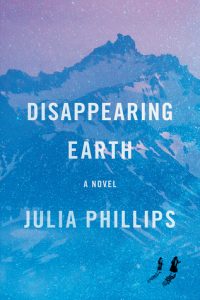 I’ll confess that before reading Disappearing Earth, I hadn’t heard about the indigenous Even people of Russia, nor of Kamchatka (my knowledge of history and geography, let alone the two combined, is woeful at best), but I can say that Phillips’ beautiful rendering of the landscape of Petropavlovsk-Kamchatsky and descriptions of the women living in the town (or the wide vicinity of it) in the novel made me want to find out more. (In fact, one of the characters in Disappearing Earth, the mother of the disappeared girls, also notes how she is unfortunately more ignorant than she’d like regarding the history of the treatment of indigenous peoples in Russia because it wasn’t in the curriculum when she was in school; she notes how her daughters would’ve known more, because they’re taught in school now about the indigenous peoples of northern Russia: what is taught, I’m not sure.) Disappearing Earth begins with the kidnapping of two girls – Alyona and Sophia, aged 11 and 8 – while they were walking around by themselves along the beach in late summer. But it doesn’t follow the same path other novels that start with a kidnapping might: the format itself is a twist on the thriller/investigative mystery genre, the portrayal of the useless and often misguided police officers only incidental to the much larger story told through different women in the area affected in various ways, large and small, by the kidnapping. This centering of women explores the ways in which women, especially indigenous women in Petropavlovsk-Kamchatsky, lack power in their lives; and immediately brings to mind the epidemic of missing and murdered indigenous women in North America (see Highway of Tears by Jessica McDiarmid, for which other resources I’ve also listed in a previous post). Which, interestingly enough, Phillips herself admits in an interview with The Paris Review:
I’ll confess that before reading Disappearing Earth, I hadn’t heard about the indigenous Even people of Russia, nor of Kamchatka (my knowledge of history and geography, let alone the two combined, is woeful at best), but I can say that Phillips’ beautiful rendering of the landscape of Petropavlovsk-Kamchatsky and descriptions of the women living in the town (or the wide vicinity of it) in the novel made me want to find out more. (In fact, one of the characters in Disappearing Earth, the mother of the disappeared girls, also notes how she is unfortunately more ignorant than she’d like regarding the history of the treatment of indigenous peoples in Russia because it wasn’t in the curriculum when she was in school; she notes how her daughters would’ve known more, because they’re taught in school now about the indigenous peoples of northern Russia: what is taught, I’m not sure.) Disappearing Earth begins with the kidnapping of two girls – Alyona and Sophia, aged 11 and 8 – while they were walking around by themselves along the beach in late summer. But it doesn’t follow the same path other novels that start with a kidnapping might: the format itself is a twist on the thriller/investigative mystery genre, the portrayal of the useless and often misguided police officers only incidental to the much larger story told through different women in the area affected in various ways, large and small, by the kidnapping. This centering of women explores the ways in which women, especially indigenous women in Petropavlovsk-Kamchatsky, lack power in their lives; and immediately brings to mind the epidemic of missing and murdered indigenous women in North America (see Highway of Tears by Jessica McDiarmid, for which other resources I’ve also listed in a previous post). Which, interestingly enough, Phillips herself admits in an interview with The Paris Review:
I don’t think of myself as engaging with the Russian literary tradition at all, really. I feel like what I brought to the story and the place were very much American concerns and American ideas. As much I tried to accurately reflect what I was seeing, what I was seeing was deeply informed, if not completely informed, by my Americanness.
(Julia Phillips in interview for The Paris Review: The Ideal Place to Disappear)
So then… why this isolated Russian Far East peninsula of Kamchatka?